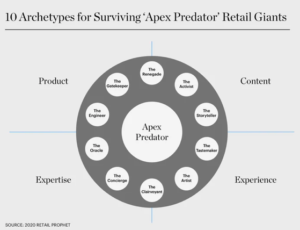Story
Marketing analytics is not important

 No, marketing analytics is essential. A new study about the use of marketing analytics referred in Strategy + Business concludes that ‘the more a company uses these techniques, the more it will reap positive and sustainable performance achievements’. However, this isn’t evident for everyone.
No, marketing analytics is essential. A new study about the use of marketing analytics referred in Strategy + Business concludes that ‘the more a company uses these techniques, the more it will reap positive and sustainable performance achievements’. However, this isn’t evident for everyone.
The other day I attended a course about corporate strategy. It’s part of a board member certification I’m getting so the course level is generally high. However, during this particular course the lecturer chose to focus more on marketing strategy which is not the same as corporate strategy. Indeed, a good marketing strategy informs and subsequently supports the corporate strategy but it is not the corporate strategy.
But the real problem was the way he lectured about customer analytics and insights: He proudly announced that 1) it’s really important to talk to your customers, 2) he had developed a completely new concept called ‘customer insight analysis’.
Now I sincerely hope that you, dear reader, is as baffled by reading this as I was when I heard him utter those words. That a management consultant can in all seriousness proclaim something as fundamental as customer insights to be ‘important’ and ‘new’ is absurd. It’s not important and it’s not new, it’s an imperative for any company and it’s a mature discipline.
But… Does this mean that all companies are employing customer analysis and insights – or marketing analytics at large? No, it doesn’t and the fact is that many companies still do not use it regularly, well, or at all.
I’ve worked with well-established and renowned firms who plan and execute comprehensive marketing programs without knowing what makes their customers buy the product or, more importantly, their barriers to purchase other than on an abstract, conceptual level. Yet, these firms happily part with hundreds of thousands of marketing dollars in the hope to create awareness, consideration and the elusive ‘brand equity’.
And the article from Strategy + Business refers to a 2009 study of 587 C-level executives at large international firms which revealed that only 10 percent of these companies used marketing analytics on a regular basis. Granted, it’s from 2009 and things have moved on since then but still it’s a terribly low number.
The article also outlines the results from the new study involving 212 Fortune 1000 companies. This study shows that some executives are still reluctant to employ marketing analytics largely with the arguments 1) there’s too much data and 2) it slows down decision-making.
True, a lot of data is daunting. That’s why it’s critical that marketing departments have strong market analysts on the team and/or work closely with a separate market research department. They are trained to see what data is needed, how to obtain it, how to analyse and interpret the data once it’s been generated, and how to make sure it’s turned into actionable insights that are deployed to focus and speed up decision-making.
The large amounts of data available certainly isn’t a reason for not using it at all. Marketing consists of a great number of variables and if we don’t know the impact of each or at least the key ones, then how can we learn what works and what doesn’t? And then how can we know if we are spending the marketing budget in the right way?
Not only are we risking the marketing budget, we are also missing out on valuable information about new potential opportunities – products, services, concepts, markets, whole approaches etc.
The study shows that the firms who employ marketing analytics improve return on assets by up to 21%. That number in itself doesn’t tell me much but the argument for me isn’t just what we can gain by using marketing analytics – it’s just as much what we lose if we don’t.
Read about the study in Strategy + Business here.





